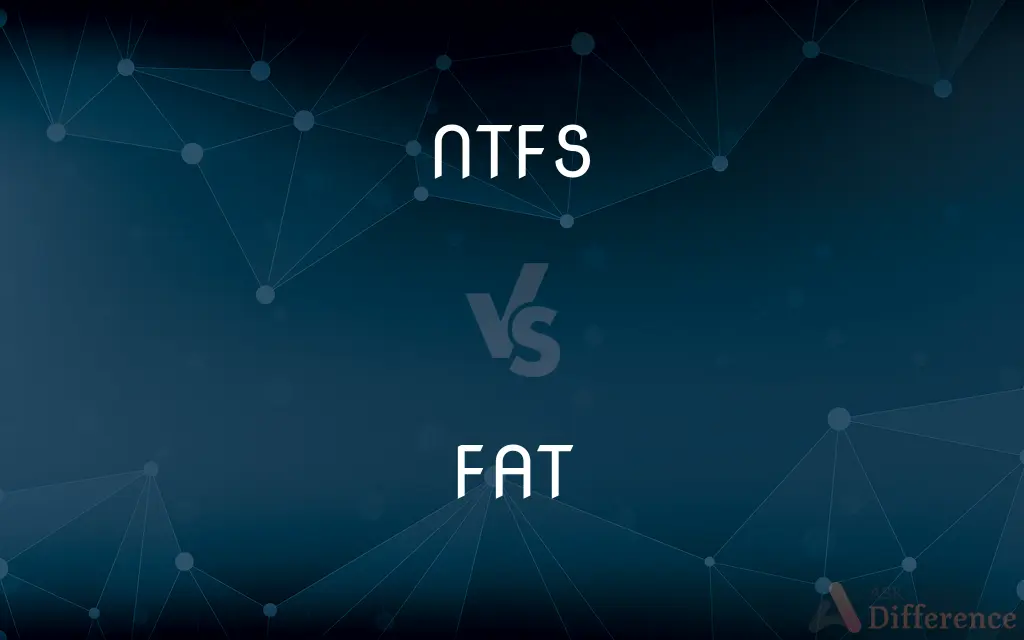NTFS vs. FAT — What's the Difference?
Edited by Tayyaba Rehman — By Fiza Rafique — Published on December 24, 2023
NTFS (New Technology File System) offers advanced features, security, and larger volume/file size support, while FAT (File Allocation Table) is simpler, older, and widely compatible but with size limitations.

Difference Between NTFS and FAT
Table of Contents
ADVERTISEMENT
Key Differences
NTFS is a modern file system used in Windows operating systems, offering robust security features. FAT, an older system, is simpler and widely compatible with various devices and operating systems.
FAT is suitable for smaller volumes and older devices, but it lacks advanced features. NTFS supports large volumes, file encryption, and file permissions, making it more suitable for newer Windows systems.
In terms of file size, NTFS allows for very large files, well into the terabytes. FAT has limitations, with FAT32 restricting file sizes to 4 GB, making it less ideal for large multimedia files.
NTFS supports disk quotas, file compression, and detailed transaction logs. FAT, due to its simplicity, lacks these advanced management features but excels in universal compatibility.
For data recovery, NTFS provides more options due to its logging features. FAT's simpler structure can sometimes make recovery easier, but it's generally less robust against data corruption.
ADVERTISEMENT
Comparison Chart
Full Name
New Technology File System
File Allocation Table
File Size Limit
Very large (16 TB or more)
Limited (up to 4 GB for FAT32)
Volume Size Support
Very large (up to 256 TB)
Smaller (up to 16 TB for FAT32)
Security Features
File encryption, permissions
Basic, no built-in encryption
Compatibility
Mainly Windows
Wide range, including older systems
Compare with Definitions
NTFS
A file system for Windows with advanced features.
He chose NTFS for its security options.
FAT
Widely compatible with various devices.
FAT worked on both her camera and laptop.
NTFS
Not as widely compatible as FAT.
NTFS wasn't supported on her old MP3 player.
FAT
Lacks advanced security features.
FAT didn't offer any encryption options.
NTFS
Provides file encryption and permissions.
NTFS encryption enhanced their data security.
FAT
The ester of glycerol and one, two, or three fatty acids.
NTFS
Has journaling for data integrity.
NTFS's journaling helped prevent data loss.
FAT
Any of various soft, solid, or semisolid organic compounds constituting the esters of glycerol and fatty acids and their associated organic groups.
NTFS
Supports large files and volumes.
NTFS was necessary for her 10 TB hard drive.
FAT
A mixture of such compounds occurring widely in organic tissue, especially in the adipose tissue of animals and in the seeds, nuts, and fruits of plants.
FAT
Animal tissue containing such substances.
FAT
A solidified animal or vegetable oil.
FAT
Obesity; corpulence
Health risks associated with fat.
FAT
Unnecessary excess
"would drain the appropriation's fat without cutting into education's muscle" (New York Times).
FAT
Having much or too much fat or flesh; plump or obese.
FAT
Full of fat or oil; greasy.
FAT
Abounding in desirable elements
A paycheck fat with bonus money.
FAT
Fertile or productive; rich
"It was a fine, green, fat landscape" (Robert Louis Stevenson).
FAT
Having an abundance or amplitude; well-stocked
A fat larder.
FAT
Yielding profit or plenty; lucrative or rewarding
A fat promotion.
FAT
Prosperous; wealthy
Grew fat on illegal profits.
FAT
Thick; large
A fat book.
FAT
Puffed up; swollen
A fat lip.
FAT
To make or become fat; fatten.
FAT
Carrying more fat than usual on one's body; plump; not lean or thin.
The fat man had trouble getting through the door.
The fattest pig should yield the most meat.
FAT
Thick; large.
The fat wallets of the men from the city brought joy to the peddlers.
FAT
Bulbous; rotund.
FAT
Bountiful.
FAT
Oily; greasy; unctuous; rich said of food.
FAT
(obsolete) Exhibiting the qualities of a fat animal; coarse; heavy; gross; dull; stupid.
FAT
Fertile; productive.
A fat soil; a fat pasture
FAT
Rich; producing a large income; desirable.
A fat benefice; a fat office;
A fat job
FAT
Abounding in riches; affluent; fortunate.
FAT
Of a character which enables the compositor to make large wages; said of matter containing blank, cuts, or many leads, etc.
A fat take; a fat page
FAT
(golf) Being a shot in which the ground is struck before the ball.
FAT
(theatre) Of a role: significant; major; meaty.
FAT
Alternative form of phat
FAT
(uncountable) A specialized animal tissue with high lipid content, used for long-term storage of energy: fat tissue.
Mammals that hibernate have plenty of fat to keep them warm during the winter.
FAT
Such tissue as food: the fatty portion of (or trimmings from) meat cuts.
Ask the butcher for a few pounds of fat for our greens.
FAT
(countable) A lipid that is solid at room temperature, which fat tissue contains and which is also found in the blood circulation; sometimes, a refined substance chemically resembling such naturally occurring lipids.
Dietary fat is not the evil that it was once misapprehended to be; carbs are increasingly recognized as a bigger driver of atherosclerosis via chronic insulin resistance and the vascular processes that cascade from it.
FAT
That part of an organization deemed wasteful.
We need to trim the fat in this company
FAT
(slang) An erection.
I saw Daniel crack a fat.
FAT
(golf) A poorly played shot where the ball is struck by the top part of the club head. (see also thin, shank, toe)
FAT
The best or richest productions; the best part.
To live on the fat of the land
FAT
Work containing much blank, or its equivalent, and therefore profitable to the compositor.
FAT
A fat person.
FAT
A beef cattle fattened for sale.
FAT
(obsolete) A large tub or vessel for water, wine, or other liquids; a cistern.
FAT
(obsolete) A dry measure, generally equal to nine bushels.
FAT
To make fat; to fatten.
Kill the fatted calf
FAT
To become fat; to fatten.
FAT
To hit a golf ball with a fat shot.
FAT
A large tub, cistern, or vessel; a vat.
The fats shall overflow with wine and oil.
FAT
A measure of quantity, differing for different commodities.
FAT
An oily liquid or greasy substance making up the main bulk of the adipose tissue of animals, and widely distributed in the seeds of plants. See Adipose tissue, under Adipose.
FAT
The best or richest productions; the best part; as, to live on the fat of the land.
FAT
Work. containing much blank, or its equivalent, and, therefore, profitable to the compositor.
FAT
Abounding with fat
FAT
Exhibiting the qualities of a fat animal; coarse; heavy; gross; dull; stupid.
Making our western wits fat and mean.
Make the heart of this people fat.
FAT
Fertile; productive; as, a fat soil; a fat pasture.
FAT
Rich; producing a large income; desirable; as, a fat benefice; a fat office; a fat job.
Now parson of Troston, a fat living in Suffolk.
FAT
Abounding in riches; affluent; fortunate.
Persons grown fat and wealthy by long impostures.
FAT
Of a character which enables the compositor to make large wages; - said of matter containing blank, cuts, or many leads, etc.; as, a fat take; a fat page.
FAT
To make fat; to fatten; to make plump and fleshy with abundant food; as, to fat fowls or sheep.
We fat all creatures else to fat us.
FAT
To grow fat, plump, and fleshy.
An old ox fats as well, and is as good, as a young one.
FAT
A soft greasy substance occurring in organic tissue and consisting of a mixture of lipids (mostly triglycerides);
Pizza has too much fat
FAT
A kind of body tissue containing stored fat that serves as a source of energy; adipose tissue also cushions and insulates vital organs;
Fatty tissue protected them from the severe cold
FAT
Excess bodily weight;
She found fatness disgusting in herself as well as in others
FAT
Make fat or plump;
We will plump out that poor starving child
FAT
Having much flesh (especially fat);
He hadn't remembered how fat she was
FAT
Having a relatively large diameter;
A fat rope
FAT
Containing or composed of fat;
Fatty food
Fat tissue
FAT
Lucrative;
A juicy contract
A nice fat job
FAT
Marked by great fruitfulness;
Fertile farmland
A fat land
A productive vineyard
Rich soil
FAT
A chubby body;
The boy had a rounded face and fat cheeks
FAT
An older, simple file system.
His vintage computer still used FAT.
FAT
Has file size limitations.
The 5 GB file was too large for FAT32.
FAT
Common in removable storage.
Her USB stick was formatted with FAT.
Common Curiosities
What does FAT stand for?
File Allocation Table, a simple and older file system.
Is FAT suitable for large external hard drives?
Not ideal due to its file and volume size limitations.
Does NTFS offer security features?
Yes, including file encryption and permissions.
What is the file size limit for FAT32?
FAT32 has a file size limit of 4 GB.
What is NTFS?
A modern file system used in Windows with advanced features.
Can I use NTFS on Linux?
Yes, but it may require additional software.
Can NTFS handle large files?
Yes, NTFS supports very large files, over 16 TB.
Is FAT still used today?
Yes, especially in removable storage and older devices.
Does NTFS work well for small USB drives?
It can, but FAT is often more practical for small drives.
Can NTFS be used on flash drives?
Yes, but FAT is often preferred for broader compatibility.
Is FAT compatible with Mac and Linux?
Yes, FAT is widely compatible with various systems.
Is FAT easier to use than NTFS?
Generally, due to its simplicity.
Does NTFS support file compression?
Yes, NTFS supports file compression.
Can I convert a FAT drive to NTFS?
Yes, but it usually requires reformatting.
Is data recovery easier on NTFS or FAT?
It depends, but NTFS often provides more options due to its logging features.
Share Your Discovery

Previous Comparison
UML vs. ERD
Next Comparison
Normal Loss vs. Abnormal LossAuthor Spotlight
Written by
Fiza RafiqueFiza Rafique is a skilled content writer at AskDifference.com, where she meticulously refines and enhances written pieces. Drawing from her vast editorial expertise, Fiza ensures clarity, accuracy, and precision in every article. Passionate about language, she continually seeks to elevate the quality of content for readers worldwide.
Edited by
Tayyaba RehmanTayyaba Rehman is a distinguished writer, currently serving as a primary contributor to askdifference.com. As a researcher in semantics and etymology, Tayyaba's passion for the complexity of languages and their distinctions has found a perfect home on the platform. Tayyaba delves into the intricacies of language, distinguishing between commonly confused words and phrases, thereby providing clarity for readers worldwide.












































